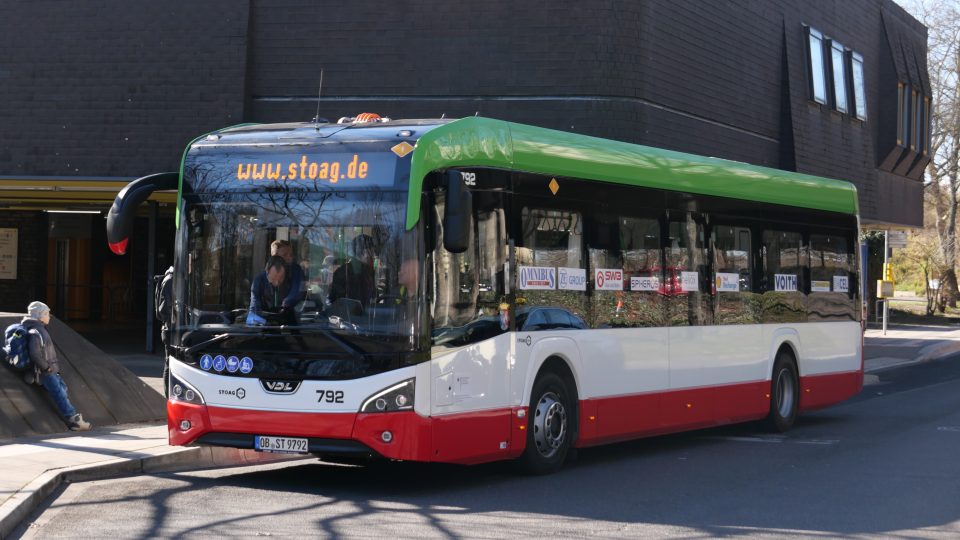Solaris releases 2022 results and announces improved version of the Urbino 18 Electric to be launched this year
1,492 buses sold (401 are battery-electric vehicles), revenues at € 696 million (with 3% decrease compared to the 721 million generated in 2021), deliveries in 18 countries. These are, in a nutshell, Solaris 2022 results, disclosed this morning during a press conference. During the digital event, Solaris’ CEO Javier Iriarte announced that “a new version […]
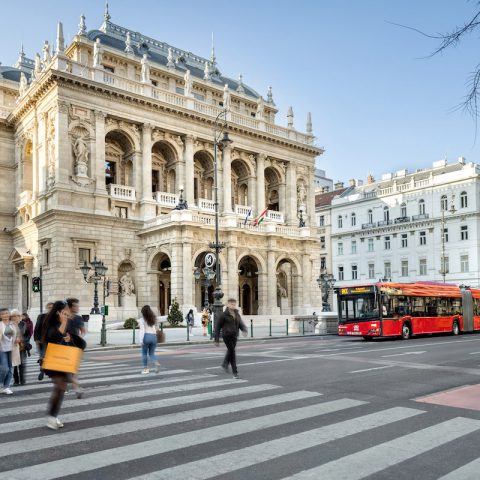
1,492 buses sold (401 are battery-electric vehicles), revenues at € 696 million (with 3% decrease compared to the 721 million generated in 2021), deliveries in 18 countries. These are, in a nutshell, Solaris 2022 results, disclosed this morning during a press conference.
During the digital event, Solaris’ CEO Javier Iriarte announced that “a new version of the Urbino articulated electric bus with modular drive will be released this year. Battery modules will be placed on the roof, engine tower will disappear. Battery capacity will be increased”.
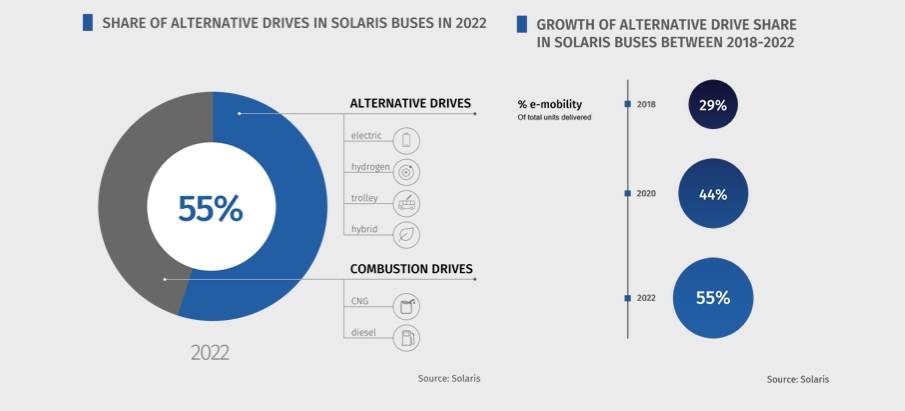
Solaris 2022 results
What about order book? As of 31 December 2022, it contained 1369 vehicles in backlog and 1648 units in order intake.
In 2022 Solaris states it has delivered in total 401 units of battery electric buses. This figures is different from the one provided by CME Chatrou Solutions its his yearly report on electric bus market in Europe – it might be assumed that battery-powered trolleybuses are counted together with buses (CME Solutions figures don’t consider trolleys). Solaris sold 42 hydrogen buses in 2022.
The impact of war in Ukraine on Solaris results 2022
In addition to the above, in 2022 global economy and the company had to navigate in a new situation caused by the war in Ukraine, Solaris highlights. While Solaris itself and most of its suppliers were not involved in business in Ukraine or Russia, some indirect suppliers were already affected by the impact of this conflict, which required special adaptation to the new conditions.
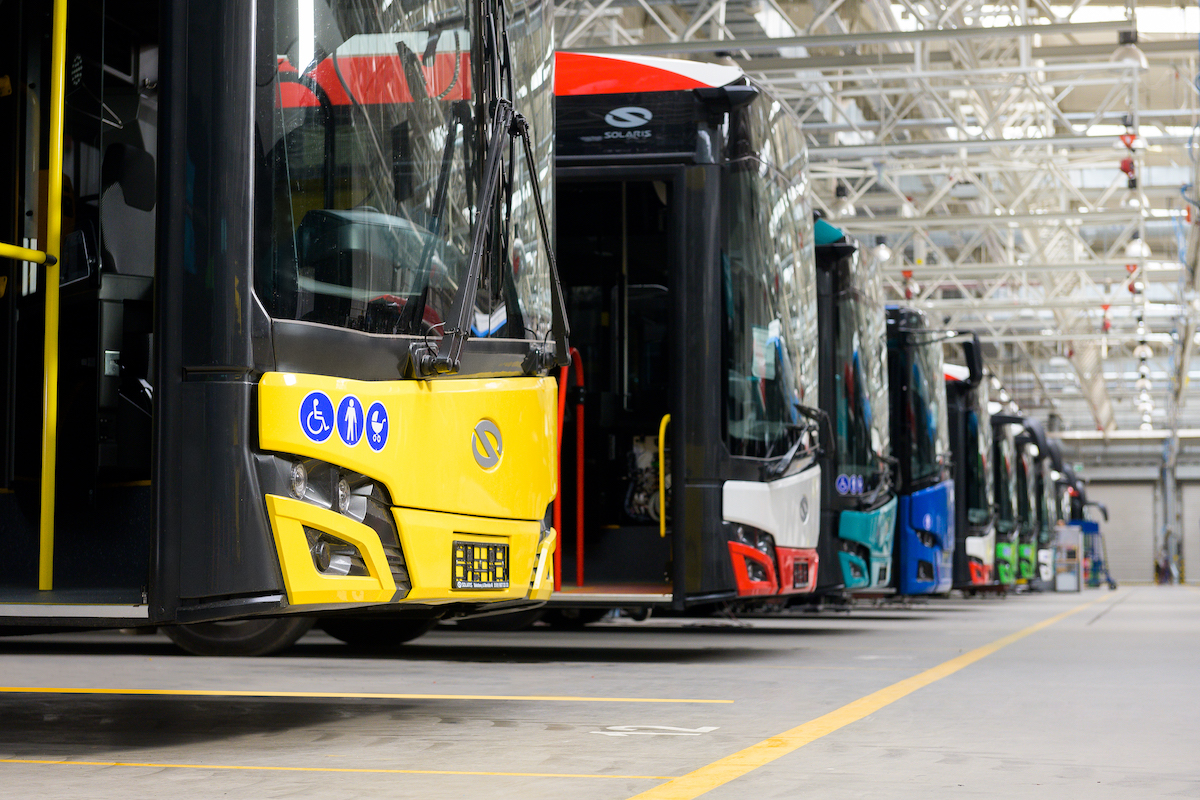
Another factor affecting the market environment was last year’s unprecedented high inflation, which in Poland reached an average level of 14.4% in 2022.
Despite these challenges, Solaris says it “has proved with its production and sales results that it is an organization well prepared for the dynamically changing market environment and is a company that is resilient to market turbulence”.
Solaris largest contracts, one by one
The largest Solaris contracts, partially or completely executed, in 2022 include – in Solaris words:
- 2022 started for Solaris by signing a contract for the delivery of 183 battery buses. Unibuss AS, one of the biggest Norwegian carriers, has again opted for Solaris’ quality and contracted delivery of 183 Urbino 18 electric buses to the Norwegian capital. Such a large one-time order for electric buses was a breakthrough in the company’s history.
- In 2022 the Italian operator ATM Milano has again placed an order for electric buses made by Solaris, going for another batch envisaged in the framework agreement for 250 vehicles. The first two batches, 140 electric Urbino buses in total, have already been delivered to the client. This time the operator has ordered another 75 units of Urbino 12 electric buses.
- In 2022 Solaris has signed its first contract for the delivery of trolleybuses to the Dutch market. Dutch operator Hermes, part of Transdev/Connexxion, has signed a contract for the delivery of 10 Trollino 18 trolleybuses featuring our unique MetroStyle design. The vehicles will make their way to Arnhem in the first half of 2024 and they will be the first Solaris trolleybuses to be deployed in the Netherlands.
- City of Poznań’s investments in green public transport are gathering pace. The city’s public transport operator MPK Poznań has purchased 25 innovative hydrogen-fuelled buses that will be supplied by Solaris Bus & Coach. This is by far the largest order for hydrogen Urbino hydrogen buses. MPK Poznań already boasts 58 electric Solaris buses, which account for nearly 20% of its fleet.
- Another contract for the delivery of hydrogen buses was signed by Solaris in Italy. Solaris will deliver four Urbino 12 hydrogen buses to Venice. The Urbino 12 hydrogen buses will serve the residents of Venice and its surroundings thanks to contracts signed with carriers AVM Venezia and ACTV SPA Venezia, which provide public transport services in Venice as well as within the communes of Venice and Chioggia.
- In 2022 Solaris has won a tender for the delivery of five hydrogen-powered Urbino 12 hydrogen buses to Palma de Mallorca, the capital of the island of Mallorca. This investment is part of the “Green Hyslan” project, financed with EU funds. The project objective seeks to promote the development of clean energy as part of initiatives aimed at combating climate change by 2050.
- In the reported period, Solaris Bus & Coach sp. z o.o. signed a contract with Latvian operator Rīgas Satiksme to deliver 35 Solaris Urbino 12 electric buses. In addition, the contract can be extended via the supply of another 17 e-vehicles. The vehicles will arrive in Riga at the end of 2023.
- On the very last days of 2022, Solaris Bus & Coach sp. z o.o. and the Romanian Municipality of Bucharest (Municipiul Bucuresti) signed a contract for the supply of trolleybuses. The order is for 100 Solaris Trollino 12 trolleybuses. The vehicles will arrive in the Romanian capital at the end of 2024.
- In 2022 city of Tallinn extends its order by another 50 Urbino CNG buses. Estonia’s largest public transport operator, Aktsiaselts Tallinna Linnatransport (TLT), which provides transport services in the Estonian capital, has ordered 20 Urbino 12 and 30 Urbino 18 CNG buses from Solaris. Tallinn has thus decided to exercise the option provided in the contract concluded in July 2021, under which 100 Solaris gas vehicles had already been purchased. Ince the order will be completed a total of 350 gas-powered Solaris buses will be running along the streets of Tallinn.
- Moreover, it is worth mentioning that in 2022 a consortium comprised of Solaris Bus & Coach, Solaris Czech and Škoda Electric submitted a winning bid in a tender concerning the delivery of 20 bi-articulated Trollino 24 trolleybuses, held by the Prague public transport operator Dopravní podnik hlavního města Prahy.
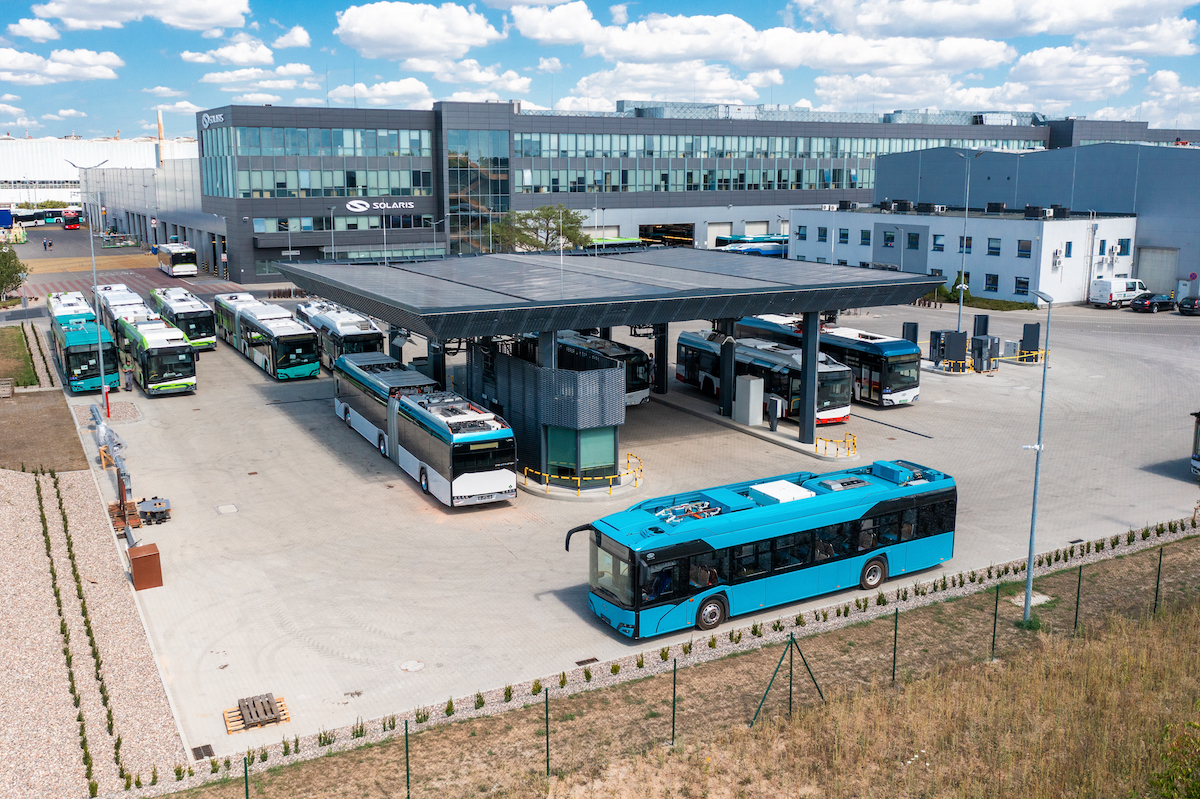
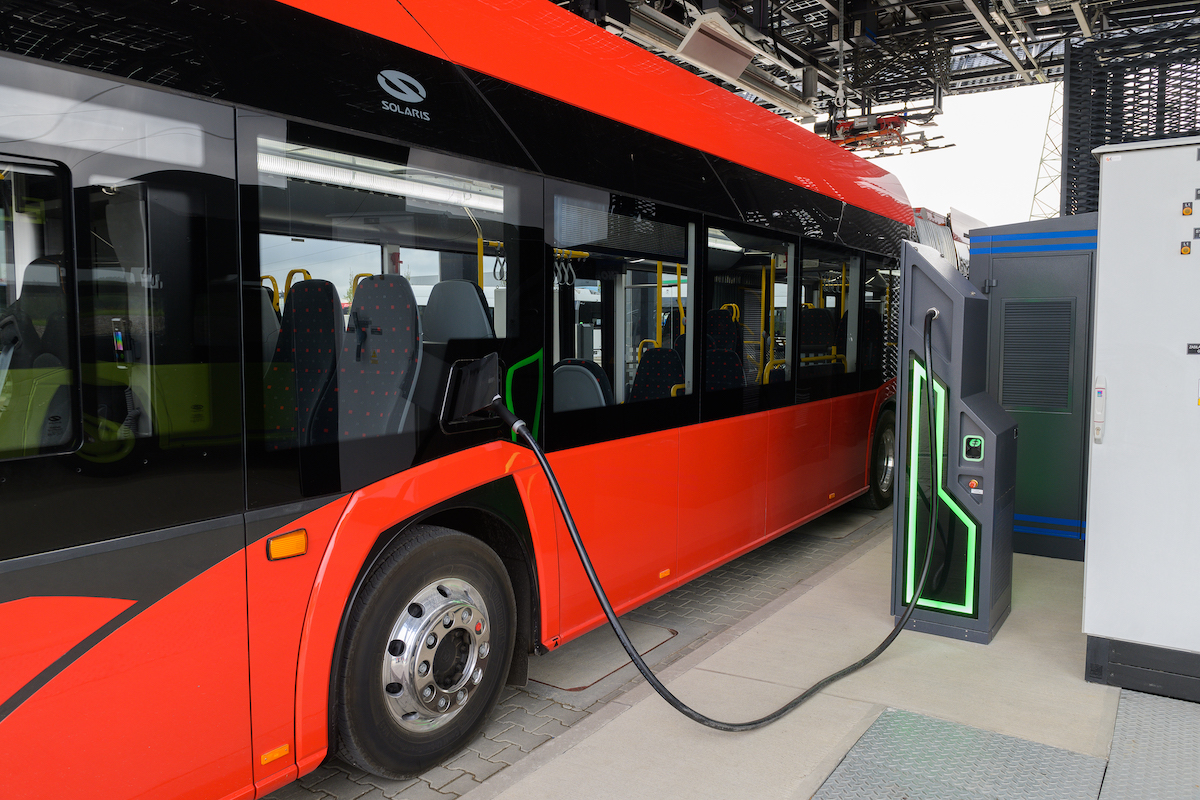
New in 2022: Solaris Urbino 18 hydrogen
In 2022 Solaris unveiled its Urbino 18 hydrogen bus. The Urbino 18 hydrogen bus is now Solaris’s second fuel cell bus in its zero-emission offer. Solaris has already received the first order for two 18-metre articulated vehicles from the German carrier Stadtwerke Aschaffenburg Verkehrs GmbH. The 12-metre version of the Solaris Urbino hydrogen bus was launched in 2019. Since then, nearly 100 hydrogen buses have already been delivered to customers in Italy, Germany, the Netherlands, Sweden and Poland. New deliveries to clients in Spain, France, and Slovakia, amongst other countries, will start soon.
New facilities and infrastructures
Among many other initiatives that have been implemented in recent months, two deserve special attention: 10,000 m2 of the new warehouse space, equipped with cutting-edge logistics systems and solutions, and the Charging Park, a unique charging station for e-vehicles. Both were announced in October 2022.
They have been built directly on the premises of the factory in Bolechowo, near Poznań, where the company’s headquarters are located.
The new Warehouse Hall has a surface area of 10,000 m2. The new warehouse plays a key role in the supply chain of parts and components needed for the manufacturing of Solaris buses and trolleybuses. The Hall is equipped with a modern multi-level warehouse platform with an automated conveyor belt. Advanced systems for smoke detection have been installed throughout the facility, and the equipment used in the new Warehouse has been fitted with special acoustic panels to dampen the noise generated by daily operations. The new warehouse facility has a reinforced roof, with 572 photovoltaic cells with a total capacity of 260 kWp installed on it. In addition, 80 kWp charging stations have been erected on the site.

The Charging Park is a multi-bay charging station for battery-powered vehicles: e-buses, hydrogen buses and trolleybuses. This investment in our own Charging Park – a single central site for charging e-buses – marks a natural step in the dynamic development of Solaris’s zero-emission range. The Charging Park has been developed to demonstrate novel charging solutions for Solaris buses to clients. It consists of eight charging bays, pantograph mechanisms, plug-in charging stations, a section of the trolleybus network, and a technical room. This is the first charging park supporting the Vehicle-to-Grid (V2G) functionality in Poland, i. e. a bidirectional energy flow between vehicles and the grid. This technology makes it possible to flexibly charge and discharge buses. It allows us to discharge buses for test purposes and to use them as mobile energy storage facilities, which leads to more effective cost management.





